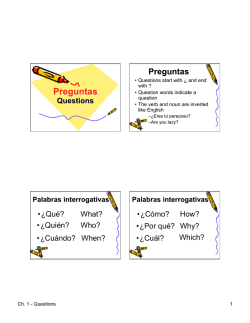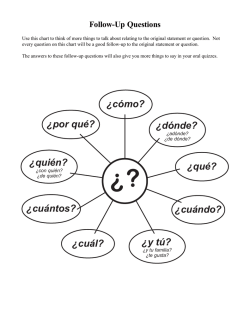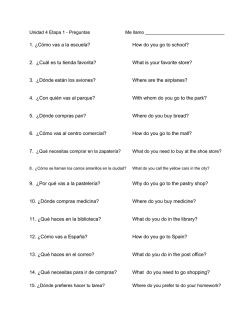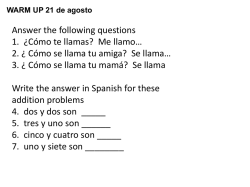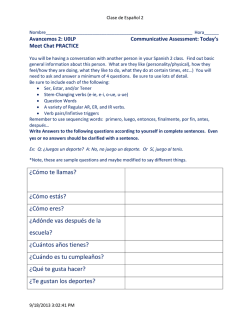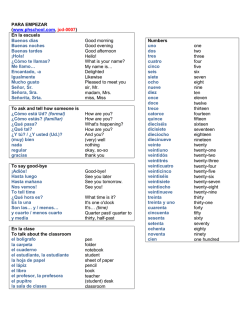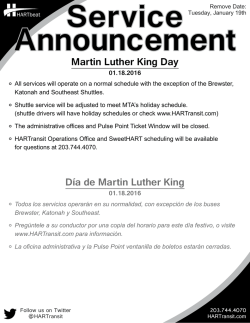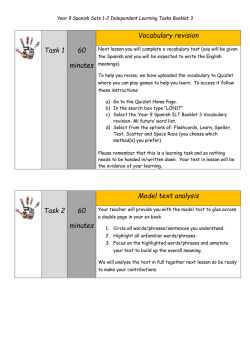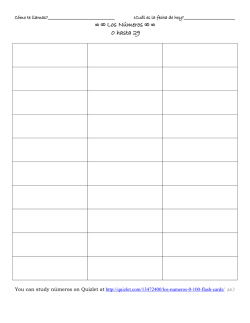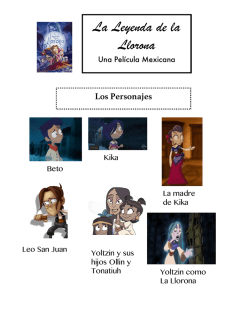
Answer Key Benchmark Review (3rd 9 weeks) Español 1A Parte A
Answer Key Benchmark Review (3rd 9 weeks) Español 1A Parte A. Speaking. (Be prepared to answer questions like the following): 1. ¿Cómo te llamas? ,¿ De dónde eres?, ¿Cómo eres? Me llamo______. Soy de ________. Soy alto/a, listo/a, simpático/a y travieso/a. 2. ¿Qué día es hoy? Trabajas mucho o poco en la clase de español? Hoy es martes. Trabajo ______. 3. ¿Qué día fue ayer? ¿Miras mucha televisión o poca televisión? Ayer fue lunes. Miro ______ televisión. 4. ¿Que día es mañana? ¿Estudias mucho o poco? Mañana es miércoles. Estudio ______. 5. ¿Qué día fue anteayer? Dibujas bien o mal? Anteayer fue domingo. Dibujo ______. 6. ¿Que día es pasado mañana? ¿Tocas el piano o la guitarra? Pasado mañana es jueves. Toco _______. o No toco _______. 7. ¿Qué te gusta más, pasar un rato con los amigos o mirar la televisión? Me gusta más______________________. 8. ¿Dónde estás? ¿Cómo estás hoy? (3 adjetivos) Estoy en la escuela. Estoy _feliz_, _cansado/a_ y __tonto/a__. 9. ¿Qué es esto? (pencil) Es un lápiz. (book) Es un libro. Parte B. Writing. (Be prepared to do other problems like the following, using the directions given): Write out the following addition problems then solve them. Be sure to write out the entire equation in Spanish. 1. 58 + 12 ______ Cincuenta y ocho más doce es setenta. 2. 88 15 _______ Ochenta y ocho menos quince es setenta y tres. Parte C. Geography. Indicate the name of the Spanish speaking countries and the country and territories where Spanish is widely spoken. Parte D. Short answer. (Be prepared to do the following.)Use the following information to answer the questions. Make sure to answer in Spanish and with complete sentences. Ayer fue viernes. 1. 2. 3. 4. ¿Qué día es hoy? Hoy es sábado. ¿Qué día es mañana. Mañana domingo. ¿Qué día fue anteayer. Anteayer fue jueves. ¿Qué día es pasado mañana? Pasado mañana es lunes. Parte E: El tiempo. (Be prepared to use a picture to do the following): Using the picture as your cue, write at least 3 (three) different, complete and logical sentences in Spanish describing the weather conditions depicted. 1. Hace sol. Hace calor. No está nublado. o No hay nubes. No llueve. No nieva. (so many more expressions are also possible!!) Parte F. Ar verb conjugation. Be prepared to conjugate ar verbs by finding the subject to decide the proper ending in the sentences provided. 1. Vosotros (draws)_dibujáis_ muy bien. 2. Phoebe y yo (work)trabajamos a menudo (often). 3. Maria y Eduardo (listen) escuchan a música cuando estamos juntos. 4. Tú (rent) alquilas muchos DVDs los fines de semana. 5. Ellos (read)leen muchos libros. Les gusta mucho leer. 6. Vosotras (ride)montáis en bicicleta todo el tiempo. 7. Yo (talk)hablo por teléfono cada día. 8. Ustedes (go for a walk)pasean cada tarde. 9. Yo siempre (bring)traigo una mochila con mis libros y cuadernos. 10. Ellos (leave)salen a las cuatro cada día. 11. Nosotros (eat)comemos el almuerzo con amigos. (Clearly you must know your vocabulary and the appropriate endings to complete the above.) Parte G. Irregular verb conjugation. . Be prepared to conjugate the irregular verbs, in parentheses, into Spanish by finding the subject to decide the proper ending. 1. Ella (gives)da la materia a los estudiantes. 2. Tú (go)vas a la clase de ciencias después del almuerzo. 3. Ustedes (go)van al cine este fin de semana. 4. Nosotros (give)damos la comida al gatito. 5. Yo no (go)voy hoy. Parte H. ¿Ser o estar? Please translate the following to Spanish: 1. How are you doing today? ¿Cómo estás hoy? 2. What is she like? ¿Cómo es ella? 3. Where is the door? ¿Dónde está la puerta? 4. Where are the computers? ¿Dónde están las computadoras? 5. Where are you from? (formal) ¿De dónde es Usted? Now, go back and answer the above questions with complete sentences and of course in Spanish. 1._Estoy tranquila/o, triste y cansada/o.__ 2._Ella es buena, simpática y cómica._ 3._La puerta está en el pasillo.__ 4._Las computadoras están en el escritorio._ 5._Soy de Colombia._ Parte I. Answer the following questions in Spanish and with complete sentences. 1. ¿Estudias mucho o poco normalmente? Estudio_______ normalmente. 2. ¿Trabajas mucho o poco en la clase de ciencias? Trabajo ________ en la clase de ciencias. 3. ¿Qué traes en la mochila?(por lo menos tres cosas) Traigo los libros, los cuadernos y los lapices. 4. ¿Qué te gusta hacer? Me gusta _________________________________. 359 + 267 Trescientos cincuenta y nueve más doscientos sesenta y siete es seiscientos veinte y seis. 596 - 422 Quinientos noventa y seis menos cuatrocientos veinte y dos es ciento setenta y cuatro.
© Copyright 2026
